
Enterprise Search Software: Definition + Top Picks in 2026
Enterprise search software has become a powerful tool for modern businesses. As companies adopt more digital tools, finding data when it matters is difficult, since it is scattered across different places.
Without an enterprise search tool, employees would struggle to locate the information they need amongst emails, documents, messages, etc. On top of that, customers would have an underwhelming experience as they would get irrelevant matches to their queries.
This blog post will help you understand what enterprise search platforms are, how they work, as well as the best enterprise search tools in the market.
What is Enterprise Search Software?
Enterprise search software is a tool that allows users to search, access, and retrieve information from across multiple data sources, both internal and external, in one centralized interface. These sources can include documents, emails, databases, intranets, cloud storage, CRMs, ERPs, wikis, and more.
Search software can be either customer-facing, such as a search bar letting users browse your website’s content, or internal, allowing your team to access business information, documents, logs, and more. The most powerful enterprise search engines use machine learning, natural language processing as well as AI to understand the intent behind each query and provide relevant, insightful answers.
Key Benefits of Using Enterprise Search Software
Enterprise search tools offer several key benefits for businesses. Here are the most important:
- Increase productivity by reducing the time spent searching for information
- Enhance decision-making with quicker access to critical data
- Help with compliance and governance by locating sensitive documents
- Reduce duplicate work by making knowledge reusable and visible
- Improve customers’ on-site experience
Types of Enterprise Search Software
Enterprise search software comes in several forms, each designed to meet specific organizational needs. Here are the most common types:
- Federated search: It aggregates search results from multiple sources (e.g., databases, cloud apps, intranet) without moving or duplicating the data. This type is ideal for companies using many disconnected systems that need a unified search experience.
- AI-powered search: It uses artificial intelligence, machine learning, and natural language processing (NLP) to understand user intent and deliver smarter, more relevant results. It often includes personalization, predictive suggestions, and semantic search capabilities.
- Insight engines: A more advanced form of AI-powered search that can surface insights by analyzing content contextually. Useful for decision-making, knowledge management, and strategic planning.
- Open-source search platforms: Flexible and customizable solutions that can be tailored to your business’s infrastructure and needs. Best for companies with strong in-house development teams who want full control over implementation and data handling.
- Embedded search tools: They offer hybrid functionality, powering both customer-facing search on websites and internal enterprise use. Ideal for businesses wanting to serve both employees and end-users through one platform.
Key Features of Enterprise Search Software
When evaluating enterprise search solutions, there are several key features that you should look for.
- Unified indexing and connectors: They should be able to crawl and index data from a wide range of sources such as email platforms, cloud storage, intranets, CRMs, ERPs, and knowledge bases, providing unified access to information from a single interface.
- Role-based access and permissions: Security features can help protect sensitive data and uphold data privacy regulations. Also, top enterprise search tools give you granular control over who can access certain repositories.
- Machine learning and AI: With the power of generative AI and machine learning algorithms, enterprise search tools can understand human queries and deliver more accurate results. This functionality also enables conversational search.
- Real-time indexing and updates: Changes to content should be reflected in search results almost instantly. This ensures that information available to employees and customers is accurate and trustworthy.
- User-friendly interface: An intuitive search interface will help with adoption. Ideally, the platform should have easy filtering, natural language processing, and the ability to auto-suggest results.
- Analytics and search insights: Admins and content managers should have access to usage data such as popular queries, zero-result searches, and click-through rates to identify content gaps and improve discoverability.
- Flexibility in deployment: Whether cloud-native or hybrid, the enterprise search solution should offer smooth integration with your existing tech stack and require minimal development resources for setup.
How Does Enterprise Search Work?
Enterprise search software works by connecting to different data sources and making them searchable from one place. Instead of opening multiple apps or digging through folders, users and employees can type what they need into a single search bar and instantly see relevant results. The software keeps everything in sync so that even new or updated files are easy to find.
Behind the scenes, it organizes and “remembers” where everything is, while also respecting who’s allowed to see what. It understands natural language, so users don’t need to know exact file names, just a few words or a phrase is often enough. The more it’s used, the smarter it gets, learning what people are looking for and improving results over time.
7 Best Enterprise Search Solutions
By now, you must have a pretty good understanding of enterprise search software and how it can help your business. Now, let’s see the top search tools available in the market.
1. Findbar
Pricing: Plans start at about $132/month
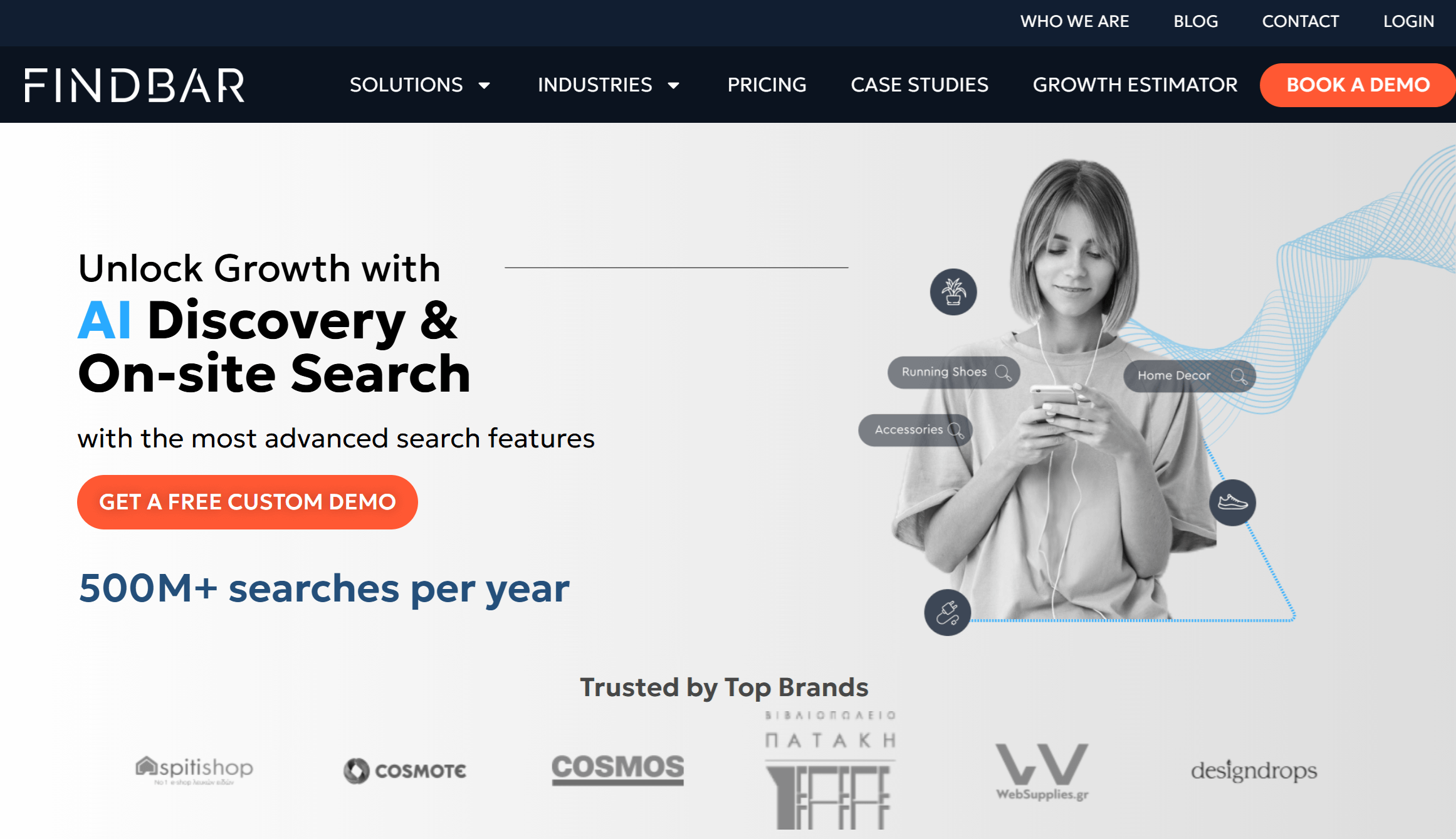
Findbar is an AI-driven enterprise search solution designed for eCommerce businesses that want to enhance product discovery, boost conversions, and monetize search experiences. It focuses on plug-and-play simplicity, offering a suite of features ideal for industries such as fashion, groceries, home goods, pharmacies, and more.
With its AI image search, customers can find what they need simply by uploading an image. They can also find similar products through AI visual recommendations. What’s more, you can provide autocomplete suggestions and make every search count despite having typos (fuzzy search). Findbar also equips you with voice and barcode search, taking your website’s search UX to the next level.
Best Features
- AI image search and visual recommendations
- Fuzzy search
- Search as you type
- Smart ranking
- File preview and quick actions
2. Coveo
Pricing: N/A
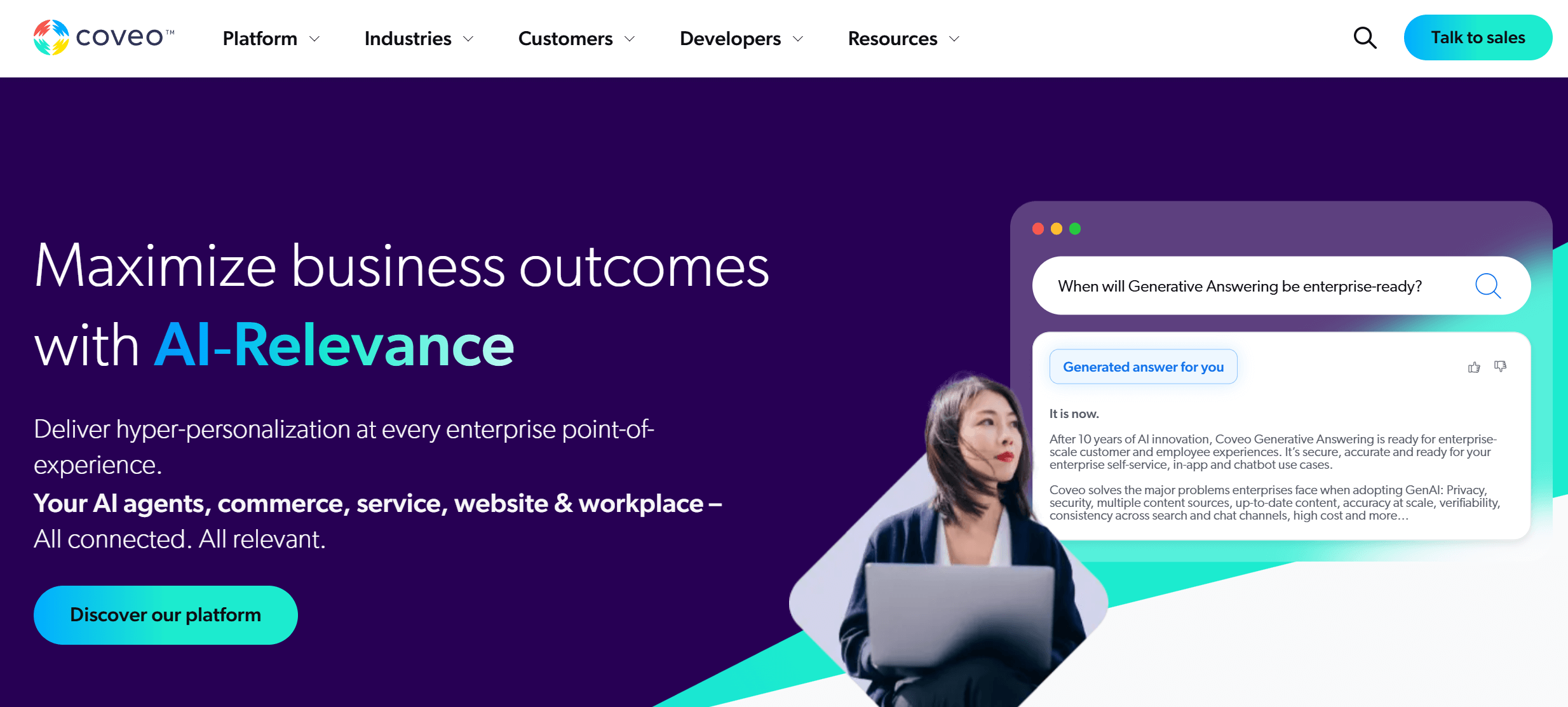
Coveo is a cloud-based AI enterprise search platform designed to unify and personalize digital experiences across various touchpoints, including websites, eCommerce platforms, customer service portals, and workplace applications. Through advanced machine learning and natural language processing (NLP), Coveo delivers contextually relevant content, enhancing both employee productivity and customer satisfaction.
This solution integrates seamlessly with various enterprise systems such as Salesforce, ServiceNow, Microsoft 365, and more. This allows unified indexing, aggregating content from multiple sources into a single index. The tool can also answer questions, providing accurate responses to user queries.
Best Features
- Semantic product search
- Unified Indexing
- Personalized search experiences
- Advanced analytics
- Cloud-native architecture for scalability
3. Glean
Pricing: N/A
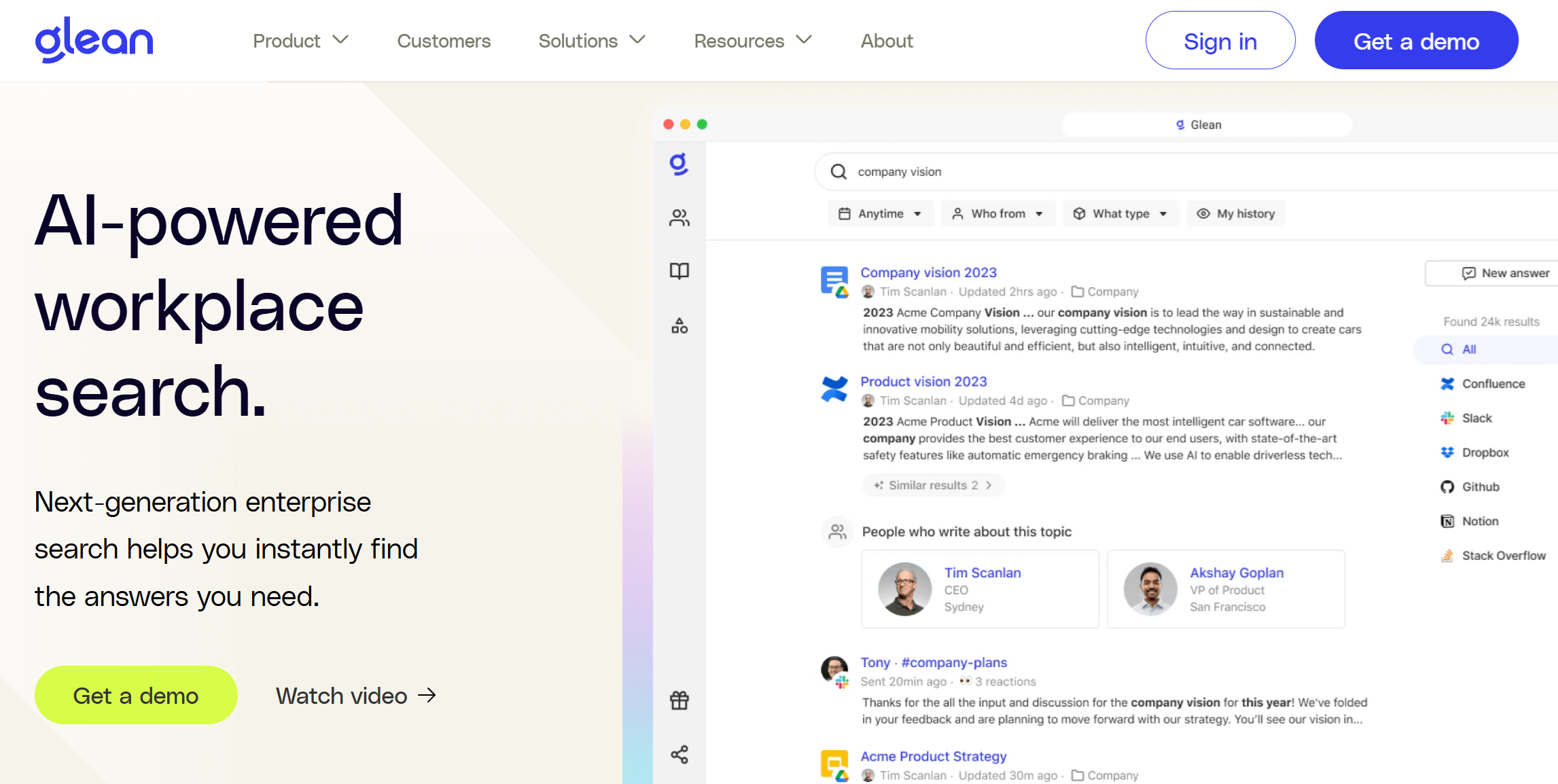
Glean is an enterprise AI search solution designed to personalize information discovery across an organization’s entire digital ecosystem. It uses large language models (LLMs) to generate concise, context-rich answers to user queries, summarizing information from various sources.
The platform supports real-time indexing with permission controls, displaying only the information users are authorized to see. It can connect with a wide array of enterprise tools, reducing the need to switch between applications. Finally, it supports compliance with standards like SOC 2 Type II, GDPR, and CCPA, ensuring data privacy and protection.
Best Features
- Generative AI-powered summaries
- 100+ connectors
- Real-time indexed results
- Robust security and compliance
4. Algolia
Pricing: N/A, free plan available
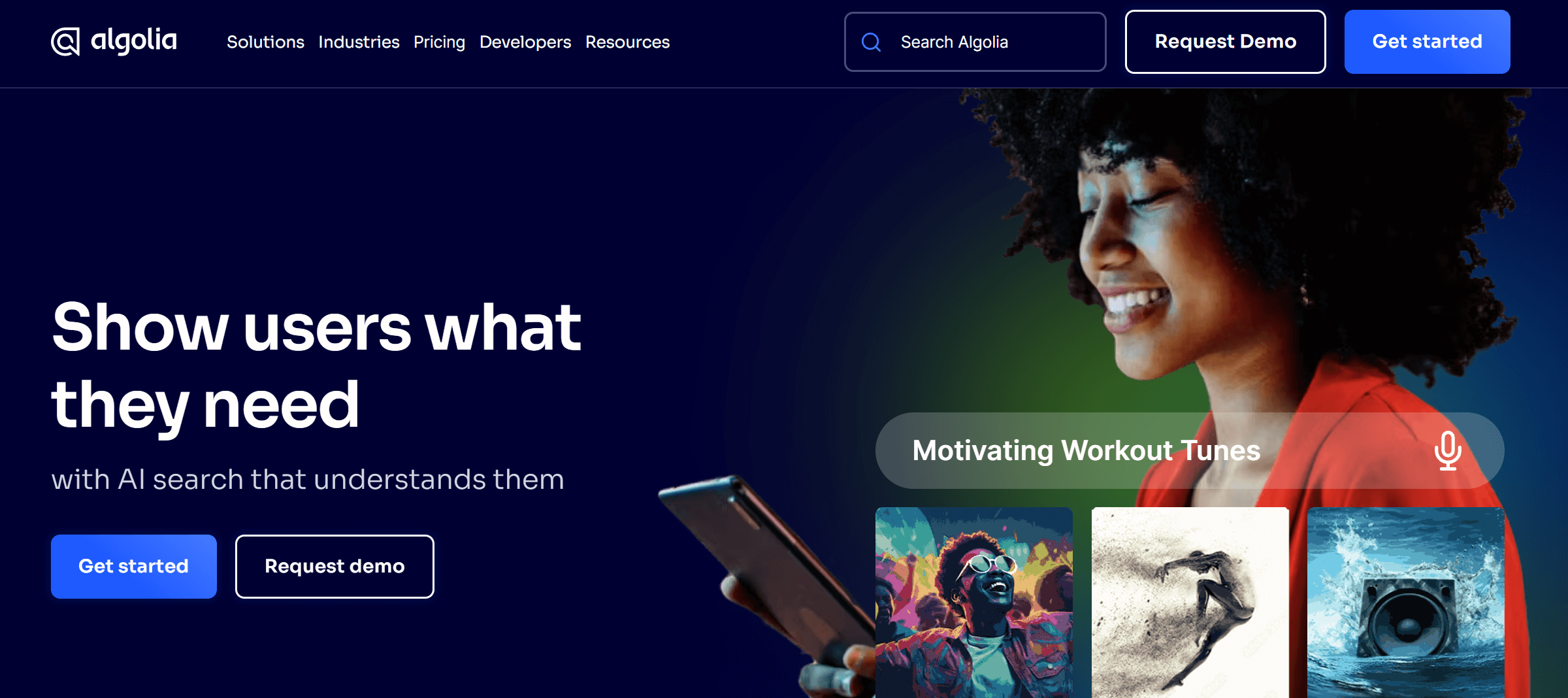
Algolia is an AI search suite built to handle vast amounts of data, delivering lightning-fast search results with high relevance. The platform supports standard search functionalities such as filtering, faceting, and result ranking, enabling users to find the information they need with ease. Its AI algorithms support dynamic synonym suggestions, ensuring that users find the right content even when using varied terminology.
Its developer-friendly environment provides robust APIs, front-end libraries, and integrations, allowing teams to build and customize applications seamlessly. Additionally, Algolia offers a user interface with a user-friendly dashboard and API control for reporting, workplace search, UX management, configuration, and A/B testing.
Best Features
- AI browsing for category pages and product listing pages
- Advanced personalization
- AI ranking to identify and boost popular content
- Merchandising Studio to create personalized shopping experiences
5. Guru
Pricing: Plans start at $18/month, 30-day free trial
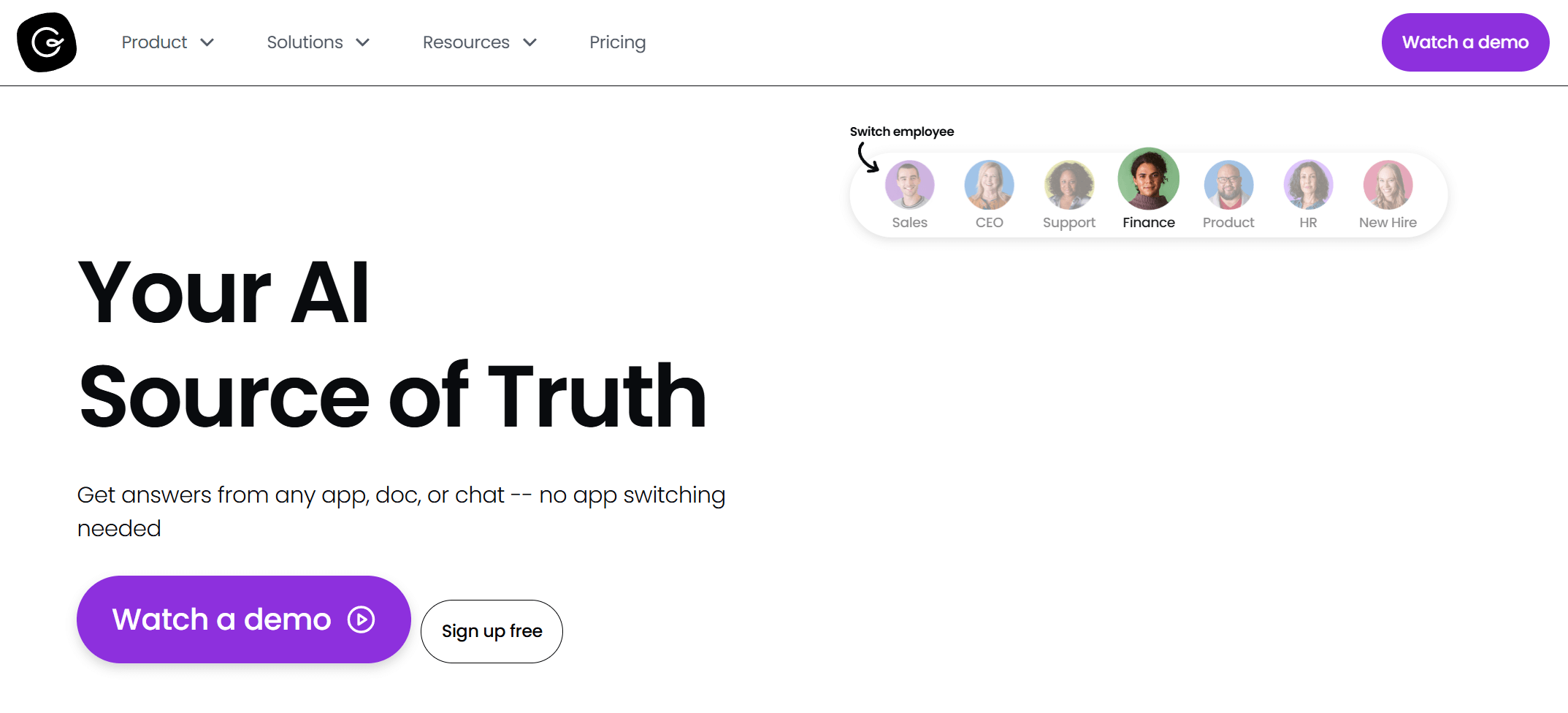
Guru is an enterprise search solution built for internal teams that need fast, accurate access to organizational information. It’s designed to work where employees already collaborate like Slack, Microsoft Teams, and web browsers, so they can get answers without breaking their workflow. Guru is especially useful for support, sales, and operations teams that rely on accurate, up-to-date knowledge to serve customers or complete tasks efficiently.
With its AI-powered suggestions, Guru surfaces the right content in context, reducing time spent searching or asking around. Teams can verify knowledge for accuracy, track usage, and ensure information stays current through smart alerts and knowledge lifecycles. Plus, Guru offers browser extensions and in-app cards, so knowledge is always just a click away.
Best Features
- AI-powered in-context suggestions
- Browser extension for instant answers
- Knowledge verification and expiration alerts
- Slack and Teams integration
- Search across docs, wikis, and apps without switching tabs
6. Elasticsearch
Pricing: Plans start at $95/month
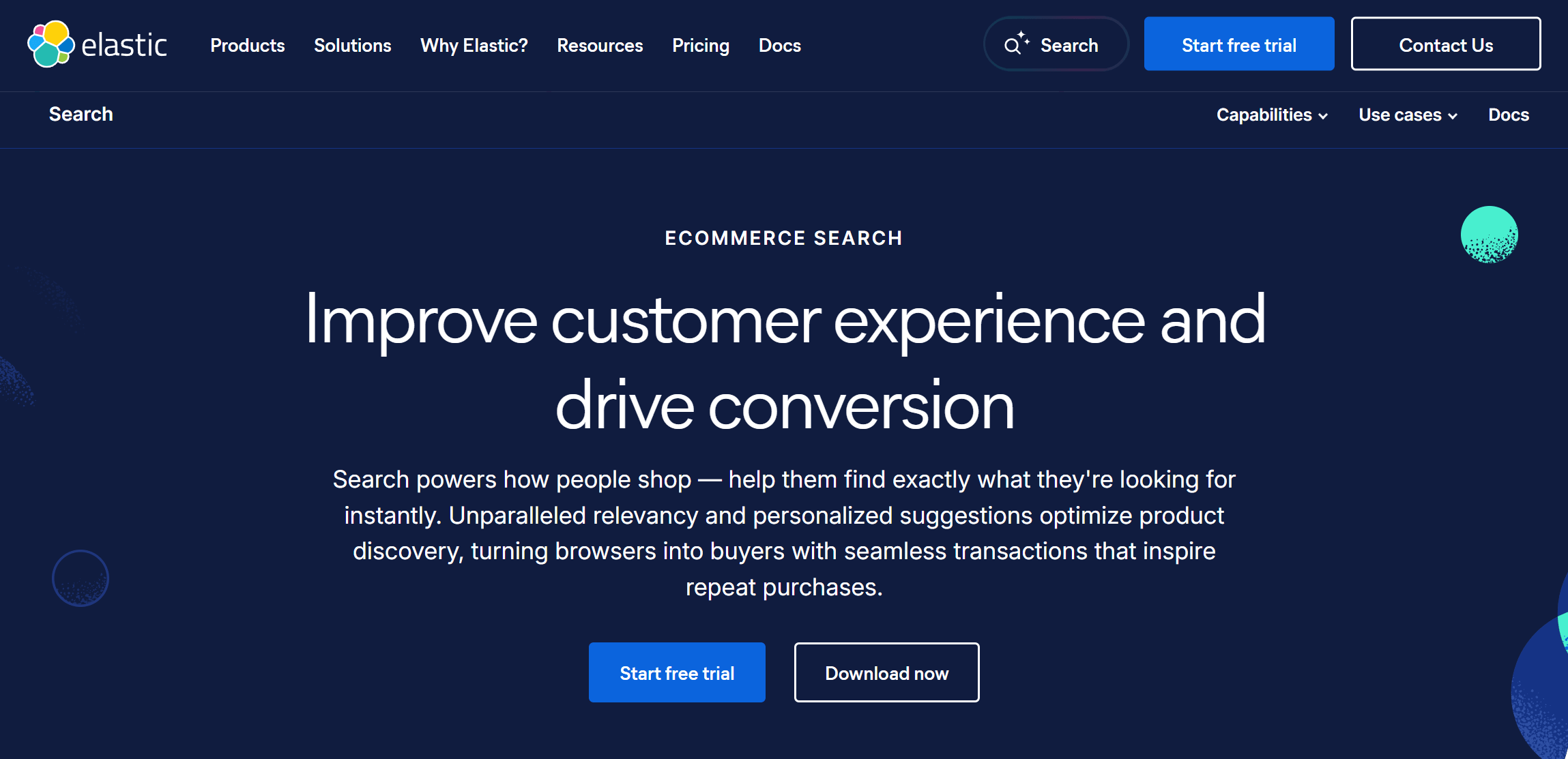
Elasticsearch is a flexible, hybrid enterprise search solution ideal for both internal enterprise search and customer-facing product discovery. This makes it a great choice for brands looking for full control and customization.
With its real-time indexing, Elasticsearch enables up-to-the-second search accuracy across massive product catalogs. It supports advanced filtering, faceting, and autocomplete, and its built-in machine learning capabilities help personalize results and detect anomalies. Whether you’re optimizing on-site search or connecting siloed internal data, Elasticsearch adapts to your needs through APIs, plugins, and integrations with popular eCommerce platforms.
Best Features
- Real-time indexing for large catalogs
- Custom relevance tuning and ranking
- Autocomplete, filtering, and faceting
- Hybrid use for internal and customer-facing search
- Machine learning integration for personalized results
7. Lucidworks
Pricing: N/A
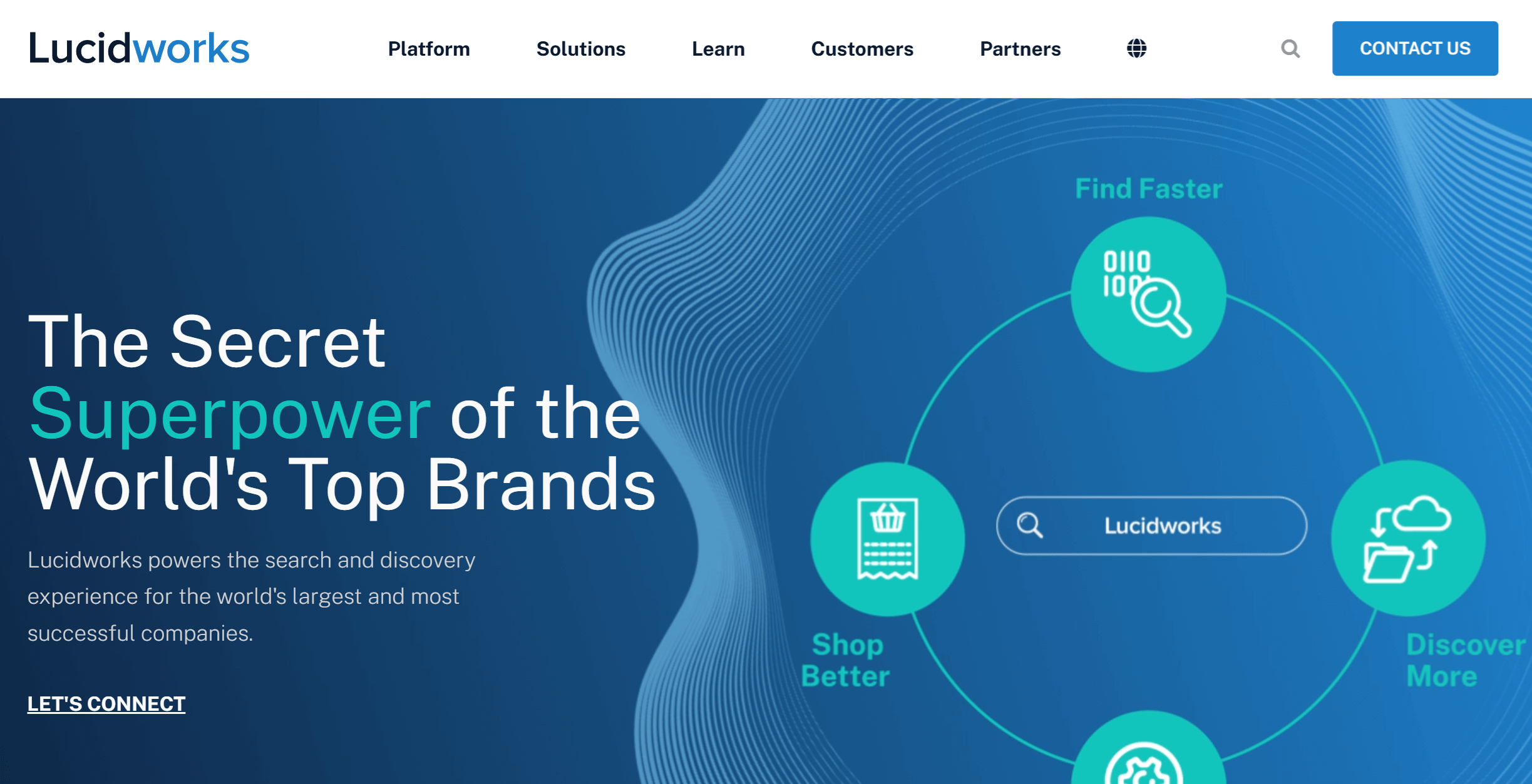
Lucidworks is an AI-powered enterprise search and product discovery solution. Through machine learning, it understands shopper intent and personalizes product pages and suggestions based on individual preferences. It can also interpret natural language and populate webpages with the right product assortment, eliminating zero-result searches.
With Lucidworks, you can also deliver smart answers via your chatbots and virtual assistants. Its AI continuously learns from user behavior to refine search results, increase conversions, and enhance digital experiences across eCommerce sites. Built for scale, Lucidworks is a strong fit for enterprise retailers seeking relevance, speed, and personalization in one unified platform.
Best Features
- Intent-based product recommendations
- Smart chat and virtual assistant
- Natural language understanding
- Automatic query refinement
Choosing The Right Enterprise Search Software
Whether you’re looking to improve your customers’ shopping experience or boost employee productivity, an enterprise search solution is the key to reaching your business’s full potential.
Consider the available options carefully, evaluate their features, and check whether their pricing plans fit your budget. The right tool can transform the way your team works, eliminating data silos, speeding up decision-making, and unlocking more value from the information you already have.




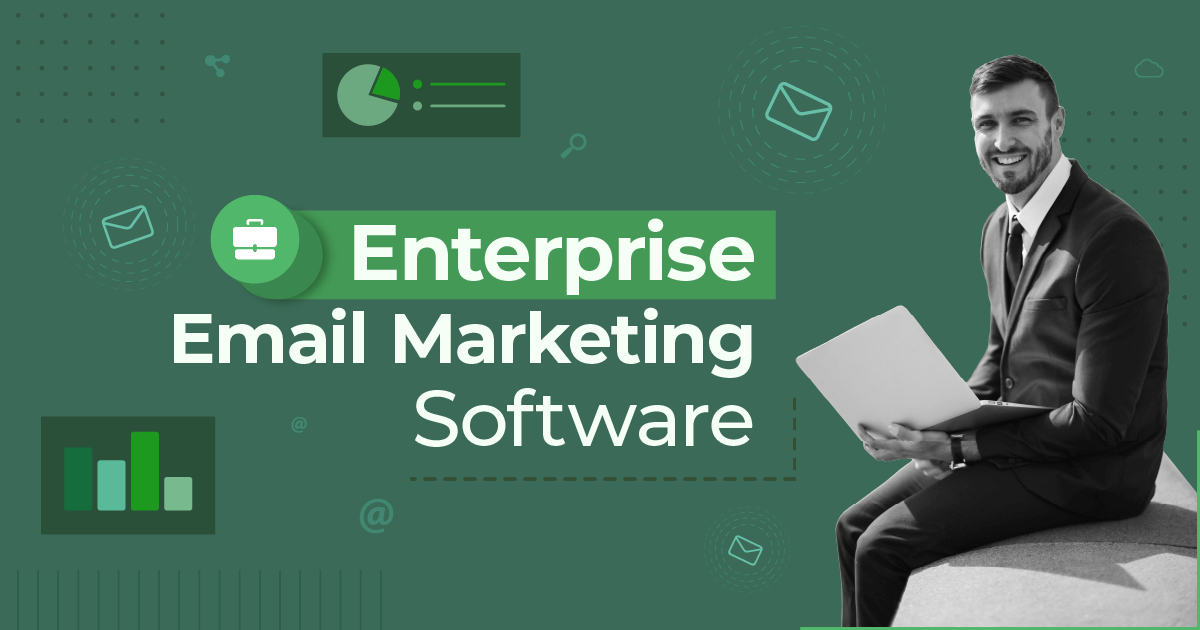
 Published by
Published by
